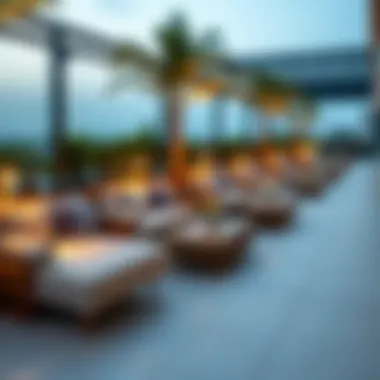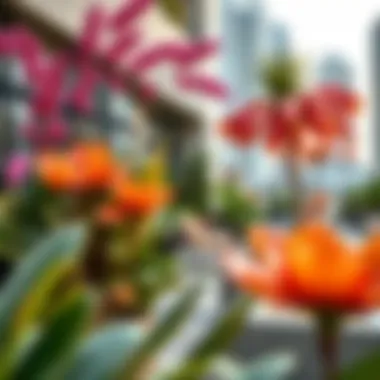Discover the Rooftop Garden Lounge at Al Qana


Intro
In the heart of Dubai’s bustling environment, the Rooftop Garden Lounge at Al Qana stands as a unique oasis—a blend of tranquility and urban vibrance. This space is not just a spot to unwind; it symbolizes a thoughtful approach to urban landscaping that addresses both community needs and ecological sustainability.
The combination of lush greenery and breathtaking views establishes an inviting atmosphere likely to entice both locals and visitors alike. This article will thoroughly explore the various facets of the Rooftop Garden Lounge, including its architectural design, role in urban planning, and its sensory aspects that connect individuals with their surroundings. We will look at how such modern public spaces enhance community bonds and contribute to the economic landscape of real estate in Dubai.
As we delve into this analysis, the importance of spaces like the Rooftop Garden Lounge becomes evident. It encourages conversation, relaxation, and a renewed appreciation for nature within an increasingly urbanized context. The upcoming sections will articulate insights into market trends, property types, and the economic implications tied to such developments.
Prologue to Rooftop Gardens
Rooftop gardens are popping up in urban landscapes like daisies in spring. These green havens not only cool down buildings but also breathe life into concrete jungles. In our deep dive into the Rooftop Garden Lounge at Al Qana, understanding the nuances of rooftop gardens is essential. This section illuminates the definition of these gardens and their historical significance, preparing us to appreciate their architectural and community impacts.
Definition and Concept
At their core, rooftop gardens are essentially layers of greenery placed atop buildings. They’re not just a pretty face; they encompass various elements that promote sustainability and enhance urban livability. Think of them as nature’s antidote to urban sprawl. By incorporating plants, trees, and even seating areas, these spaces serve multiple purposes.
Some of the benefits include:
- Stormwater management: They absorb rainwater and reduce runoff.
- Energy efficiency: By insulating buildings, they help reduce heating and cooling needs.
- Biodiversity: Providing habitats for birds and insects creates a mini-ecosystem.
This definition pulls us into the heart of why a rooftop garden, like the one at Al Qana, matters. It’s not merely a leisure space but a valuable tool for urban ecology.
Historical Context
The concept of rooftop gardens is steeped in history. These green spaces didn’t pop up out of nowhere; they have roots tracing back to ancient civilizations. Take the Hanging Gardens of Babylon, for instance. Though their existence is debatable, their legend speaks to humanity's long-standing desire to blend nature with architecture.
Fast forward to cities like Istanbul, where rooftop gardens have adorned buildings for centuries, not only for food production but also as a reprieve from bustling streets below.
In the 20th century, urbanization surged, pushing the idea of green spaces onto rooftops as more people flocked to cities. The modern-day awareness of environmental issues has only fueled interest. Now, many urban planners and architects recognize their intrinsic value in fostering ecological balance. In essence, rooftop gardens have transformed from exclusive luxury spots into accessible, mainstream fixtures essential for city life.
"In the era of concrete, rooftop gardens remind us that nature can thrive in unexpected places."
Understanding these foundations equips us with the knowledge necessary to discern the significance of the Rooftop Garden Lounge at Al Qana. This lounge isn’t just a perk; it’s part of a larger tradition that seeks to create a harmonious coexistence between urban life and nature.
Overview of Al Qana
The Rooftop Garden Lounge lies at the heart of Al Qana, an ambitious development project that plays a pivotal role in redefining urban living in the region. Al Qana stands not just as a space but as a vision that encapsulates the blend of tradition and modernity, reflecting the cultural tapestry of Abu Dhabi. Understanding this overview is essential because it sets the stage for comprehending the significance of the Rooftop Garden Lounge within the wider context.
Geographic and Cultural Significance
Al Qana’s location is no accident; it resonates with the rich heritage and contemporary aspirations of Abu Dhabi. Nestled along the waterfront, it provides stunning views that weave the beauty of nature into everyday urban life. This initiative reflects the Lebanese architectural ethos while accommodating the necessities of a growing city.
In terms of cultural importance, Al Qana becomes a hub where locals and newcomers alike can connect. It fosters community interactions through various social spaces, where the spirit of camaraderie dances between individuals from diverse backgrounds. The presence of the Rooftop Garden Lounge augments this cultural dialogue, offering spaces not only for relaxation but also for cultural exchange.
Development Vision and Goals
The development of Al Qana aligns with Abu Dhabi’s larger ambition of creating sustainable and innovative urban environments. The vision for this project emphasizes not just physical structures but also the creation of ecosystems—both ecological and social. By integrating green spaces and public areas effectively, the development aims to promote well-being and foster a sense of belonging.
Key goals include:
- Sustainability: Incorporating eco-friendly practices in construction and operation.
- Accessibility: Making public spaces open for all, and increasing mobility within urban settings.
- Community Engagement: Introducing facilities that serve as gathering points, bridging gaps between the community and developers.
In moving toward these goals, Al Qana may serve as a model for future urban planning projects throughout the region. The Rooftop Garden Lounge is a testament to this vision, offering a refreshing escape while embodying the interconnectedness of nature and city life. Overall, the narrative of Al Qana resonates as an important chapter in redefining the future of urban spaces, making it a focal point for residents, tourists, and investors.


Design Features of the Rooftop Garden Lounge
The design features of the Rooftop Garden Lounge at Al Qana present a multifaceted approach to urban landscaping, merging aesthetics with functionality. This section delves into the architectural elements, landscaping innovations, and sustainable practices that define this captivating space. The culmination of thoughtful design principles not only enhances the lounge’s visual appeal but also contributes significantly to its role as a community hub, making it essential for investors and property buyers to understand its importance.
Architectural Elements
The architectural elements of the Rooftop Garden Lounge echo an ethos of modernity, blended with cultural references that resonate with the local community. With an inviting design that promotes interaction, the space employs features such as open-air layouts, transparent railings, and shaded areas furnished with comfortable seating.
Key aspects include:
- Open Spaces: The generous open areas allow natural light to flood in, creating a warm and inviting atmosphere.
- Local Materials: Incorporating local stone and wood offers authenticity and connects the lounge to its surrounding environment.
- Design Inspiration: The architecture takes cues from traditional Emirati design, marrying modern lines with cultural motifs.
These elements foster a sense of belonging while attracting both locals and expatriates, making it an ideal setting for social gatherings and community events.
Landscaping Innovations
The landscaping innovations at the rooftop lounge push the boundaries of how urban greenery is integrated within a cityscape. Vertical gardens and green walls not only enhance the aesthetic but also aid in improving air quality and providing insulation to the building.
Highlighted features include:
- Native Plant Selection: Utilizing local flora not only conserves water but also supports local biodiversity, making the garden a living ecosystem.
- Water Features: Incorporating fountains or pools adds to the sensory experience, contributing to tranquility and reducing urban noise.
- Functional Gardens: Edible plants are included, encouraging an awareness of sustainability and wellness among visitors.
These innovations underscore a commitment to eco-conscious design while promoting ecological balance in an urban setting.
Sustainable Practices
Sustainable practices form the backbone of the Rooftop Garden Lounge's design philosophy. The lounge not only serves as a recreational area but also demonstrates a commitment to environmental stewardship that appeals to today’s eco-aware investors.
Considerations include:
- Rainwater Harvesting: Systems capture and reuse rainwater for irrigation, significantly reducing water consumption.
- Solar Energy Integration: Solar panels provide energy for lighting and other amenities, promoting energy efficiency.
- Green Energy Initiatives: By partnering with local green energy providers, the lounge aims to operate with a reduced carbon footprint.
Overall, the design feature of the Rooftop Garden Lounge is not just about viewing pleasure–it’s a thoughtful approach to reimagining urban spaces while addressing climate challenges.
"Successful design blends functionality with beauty, revealing a commitment to community and environment."
This blend of architectural innovation, smart landscaping, and sustainable initiatives not only heightens the leisure experience but also enhances property value, making it an optimal choice for investors seeking to make a meaningful impact in the real estate landscape.
Community Engagement and Social Impact
Creating a sense of community is more than just gathering people; it’s about weaving social fabric that binds individuals together, encouraging a vibrant exchange of ideas and support. The Rooftop Garden Lounge at Al Qana serves as a prime example of how a well-designed public space can foster social interaction and contribute significantly to the local community. The importance of community engagement in this context cannot be overstated. The Lounge's very existence plays a crucial role in creating opportunities for connections that go beyond casual encounters and promote meaningful relationships among its diverse visitors.
Creating Social Spaces
At the heart of community engagement is the creation of social spaces where individuals can come together, relax, and interact. The Rooftop Garden Lounge is designed with this intention, offering a variety of seating arrangements and open areas that invite both small and large gatherings. Areas such as cozy nooks or communal tables are strategically placed to facilitate interaction. Whether it’s a group of friends catching up or new acquaintances striking up conversations, these spaces encourage socialization in a relaxed atmosphere.
Furthermore, elements like greenery, water features, and art installations not only enhance the visual appeal but also provide backdrops for social gatherings. People naturally gravitate toward beauty, and this space draws them in. It’s more than just a garden; it’s a stage for life’s daily interactions, where people can enjoy each other’s company amid the calm of nature. This mix of design and purpose transforms ordinary experiences into moments of connection.
Events and Activities Hosted
Events and activities hosted at the Rooftop Garden Lounge further amplify its community engagement potential. From farmers' markets to art exhibitions, the variety on offer ensures there is something for everyone. For instance:
- Workshops and Classes: Gardening workshops, cooking classes, and art sessions provide hands-on experiences that foster learning and collaboration.
- Live Music and Performances: Regular musical events create a lively atmosphere that encourages visitors to relax and socialize, allowing musical talent to be showcased while community members gather to enjoy.
- Health and Wellness Events: Yoga sessions and fitness classes held outdoors not only promote healthy living but also bring together like-minded individuals to share their fitness journeys.


"A community is not just a collection of individuals but a dynamic, living entity that thrives on engagement and collaboration."
Such activities not only provide entertainment but also help solidify a sense of ownership among community members. When residents see themselves reflected in the events held in their space, it fosters pride and loyalty, making the Rooftop Garden Lounge a beloved local gathering spot.
Economic Implications for Real Estate Investors
Understanding the economic implications of the Rooftop Garden Lounge at Al Qana is crucial not just for investors, but also for homeowners and agents. This space serves as more than just a visual treat; it brings about tangible economic benefits that can have a ripple effect on property markets and urban living standards. Investors assess various facets, from potential capital appreciation to demographic changes, all of which are echoed through the presence of such innovative spaces.
Investment Opportunities
The Rooftop Garden Lounge presents a unique opportunity for investment, particularly in the rapidly growing Dubai market. With the increasing popularity of sustainable and community-focused developments, properties with rooftop gardens can attract a premium. Investors might find several key opportunities here:
- High Demand for Eco-Friendly Spaces: As consumers become more environmentally conscious, properties that incorporate green designs are starting to see increased interest.
- Diverse Target Audience: The Rooftop Garden Lounge appeals not only to locals but also to expatriates. This dual appeal enhances the versatility of the investment.
- Community Engagement: The lounge can serve as a hub for community activities, increasing foot traffic and enhancing the desirability of the adjacent properties.
Real estate agents can leverage these points to highlight properties near the lounge as prime investment opportunities.
Impact on Property Values
The presence of a well-designed rooftop garden can significantly elevate property values within the vicinity. Several factors contribute to this upward trend:
- Enhanced Aesthetic Appeal: Properties with access to greenery and open spaces generally command higher prices compared to their counterparts without such amenities.
- Increased Quality of Life: Rooftop gardens foster a better living environment, contributing to higher demand. When homes provide access to leisure spaces, investors see a favorable impact on rental yields and occupancy rates.
- Market Differentiation: Properties that offer unique features, like a rooftop lounge, become memorable. This differentiation can lead to competitive pricing and greater desirability.
Investors looking to capitalize on the benefits of the Rooftop Garden Lounge can expect both immediate returns and long-term value appreciation as urban living continues to evolve.
User Experience and Atmosphere
The User Experience and Atmosphere of the Rooftop Garden Lounge at Al Qana is not just a footnote; it's the beating heart of what makes this place special. The atmosphere isn't simply created by the physical layout or fancy furniture; it encapsulates the very essence of relaxation, engagement, and community interaction. For investors and homeowners alike, understanding this facet can be a game changer in choosing where to spend time and resources.
Aesthetic Enjoyment
Aesthetic enjoyment at the Rooftop Garden Lounge is one of its standout features. The design invites visitors to pause and take in the beauty of their surroundings. Exquisite landscaping tailors to the senses, with native plants and flowers punctuating the lush greenery. Visitors can find themselves lost in the delightful visuals created by different shades of green, interspersed with splashes of color from flowering plants.
Consider the architectural elements—like open-air seating areas shaped to accommodate both intimate gatherings and larger social events. The incorporation of natural materials throughout enhances this experience; wood, stone, and water features create a connection with nature that is often missing in urban spaces.
"Aesthetic enjoyment is not merely seeing; it’s experiencing, feeling, and creating memories."
Furthermore, the lighting plays a crucial role. Soft, ambient lighting transitions from day to night, transforming the lounge into a cozy evening retreat. The view of the sunset, lit up by the warm glow of twilight, adds a magical touch that enhances the overall aesthetic.
Sensory Engagement
Sensory engagement is pivotal in shaping a memorable visit to the Rooftop Garden Lounge. The meticulous design considers how various elements interact with the senses. From the scent of fresh herbs wafting through the air to the sound of water cascading over rocks, every aspect is crafted to promote relaxation and comfort.
The lounge offers a deliberate blend of sights, sounds, and smells to immerse its visitors fully:
- Visual Elements: Brightly colored flowers, verdant foliage, and thoughtfully placed sculptures catch the eye.
- Auditory Aspects: The gentle rustling of leaves, combined with the soft murmur of conversation, creates a serene soundscape.
- Olfactory Delights: The mix of plants releases various natural scents, enhancing the sensory experience.
Each visit unfolds as a new tapestry of sensations, ensuring that regardless of frequency, no two experiences are ever quite the same. From social gatherings to moments of solitude, the lounge offers a versatile backdrop for diverse activities.
In summary, both aesthetic enjoyment and sensory engagement are crucial to the overall user experience in the Rooftop Garden Lounge. They not only foster a sense of belonging and connection but also solidify the lounge's position as a magnet for community interaction in Al Qana. With significant implications for potential investors, homeowners, and expatriates, these features serve as both a refuge and a venue for enriched urban life.
Challenges and Considerations
When delving into the intricacies of the Rooftop Garden Lounge at Al Qana, it's pivotal to address the challenges and considerations that stem from its design and upkeep. These aspects not only influence the user experience but also intertwine with broader environmental and economic implications. Understanding these factors offers valuable insights for investors, community members, and urban planners alike.


Maintenance and Sustainability
The success of any rooftop garden hinges greatly on its maintenance and sustainability practices. Regular upkeep is more than just routine tidy-up; it often involves meticulous planning and management strategies that ensure the garden remains lush and inviting. Proper irrigation systems, such as drip irrigation, can help optimize water usage, addressing both sustainability concerns and the practicalities of maintaining greenery in an urban setting.
- Vegetation Choice: Selecting native or drought-resistant plants can significantly reduce water needs and ensure resilience against local climatic conditions.
- Soil Health: Regular testing and amendment of the soil are paramount. A healthy soil ecosystem supports a thriving garden, making it a vital ingredient for longevity.
- Waste Management: Incorporating composting systems can minimize waste and provide nutrient-rich soil, thus closing the loop on food waste generated from surrounding facilities.
Ultimately, fostering sustainable practices in the rooftop garden supports not only a beautiful landscape but also a commitment to environmental sustainability. This aspect tends to appeal to a broader audience looking for investments in green technologies or eco-conscious projects.
Climate Adaptation Strategies
As climate change continues to shape urban landscapes, the Rooftop Garden Lounge must evolve to remain resilient. Climate adaptation strategies are key to ensuring that this space can thrive despite changing weather patterns and extreme climatic events that may become more frequent.
- Stormwater Management: Implementing green roofs can naturally manage stormwater, reducing runoff and minimizing flooding risks, which is essential for urban areas prone to heavy rainfall.
- Heat Reflection: Using reflective materials or lighter-colored finishes in the lounge's design can mitigate heat absorption, helping to keep the environment cooler and more comfortable during sweltering summers.
- Biodiversity Enhancement: By encouraging a variety of plant species, the garden can create habitats for local wildlife, thus contributing to urban biodiversity.
Thoughtful climate adaptation not only serves the ecological system but bolsters the garden's standing as a resilient urban oasis, attractive to both users and investors looking for forward-thinking properties.
A well-maintained rooftop garden doesn't just beautify the skyline; it fosters community and enhances property value, turning challenges into opportunities for growth.
In sum, while the challenges of maintaining the Rooftop Garden Lounge at Al Qana may seem daunting at first glance, they also present a rich tapestry of opportunities. Understanding and addressing these challenges lays the groundwork for a thriving urban garden that offers lasting benefits for the community and beyond.
The Future of Rooftop Gardens in Urban Areas
The integration of rooftop gardens into urban landscapes has transcended mere aesthetic appeal, morphing into a pressing necessity for sustainable city development. These verdant spaces address numerous environmental and social challenges posed by rapid urbanization. As cities swell, the need for green spaces becomes crucial, not just for leisure and beautification, but for fostering ecological resilience and community well-being.
Trends in Urban Landscaping
The trends shaping urban landscaping reflect a broader movement toward sustainability and community inclusivity. People now are leaning towards designs that blend nature with architecture, spotlighting eco-friendliness and relaxation. Key trends emerging in the landscape include:
- Vertical Gardens: These help in maximizing space usage in densely populated areas. By going vertical, city dwellers can transform bare walls into lush green canvases.
- Biodiversity Enhancement: Urban planners are incorporating native plants, which are not only more resilient but also support local wildlife, helping to restore natural ecosystems.
- Edible Landscapes: The concept of integrating food-producing plants into landscapes is on the rise, offering communities fresh produce and reducing carbon footprints associated with food transport.
- Smart Technology Integration: The adoption of IoT devices for monitoring soil moisture and light levels is becoming common, ensuring that gardens thrive with minimal human intervention.
- Water Management Solutions: Innovations aimed at conserving water, such as rainwater harvesting systems and greywater recycling, are vital to sustainable urban gardening.
These trends inform the planning and implementation of rooftop gardens, reflecting the dual mission of beautification and environmental stewardship.
Potential for Scaling
Rooftop gardens in urban settings hold immense potential for scaling, not merely in number, but also in scope and effectiveness. Several key factors contribute to this scalability:
- Urban Regulations and Policies: Many cities are recognizing the benefits of green rooftops and are adapting zoning laws accordingly. Incentives such as tax breaks or grants encourage property owners to invest in these green enhancements.
- Public-Private Partnerships: Collaborations between city governments and private developers can lead to larger, more ambitious projects that transform multiple rooftops into cohesive green spaces.
- Increased Awareness and Demand: As more people become conscious of environmental issues, the public demand for sustainable urban practices is driving the expansion of rooftop gardens.
- Cost-Effective Solutions: Advances in materials and technologies have made green roofs more affordable. Innovations in lightweight soils and modular systems have lowered entry barriers for property owners.
- Sociocultural Shifts: With urban populations increasingly valuing quality of life and mental health, the desire for accessible green spaces is resulting in a cultural shift towards supporting more rooftop gardens.
Rooftop gardens, if properly integrated into city planning, can enhance urban resilience, improve air quality, and create communal spaces, fostering both connection to nature and to each other.
"As urban areas continue to expand, rooftop gardens offer a glimpse of what's to come—a harmonious coexistence of nature and architecture, enriching city life for years to come."
End
The exploration of the Rooftop Garden Lounge at Al Qana brings to light its multifaceted significance, not just as a stunning architectural feature, but as a vital piece of the urban landscape. As cities densify and the need for green spaces becomes more pressing, such lounges offer a vital breath of fresh air amidst concrete towers. They enhance community well-being, promote environmental sustainability, and create economic opportunities, making them essential for future urban planning.
Recapitulation of Key Insights
The key takeaways from this analysis can be summarized as follows:
- Architectural Beauty: The design elements of the Rooftop Garden Lounge showcase innovative architectural thinking, seamlessly blending functionality with aesthetics.
- Community Engagement: Offering a social space for gatherings, events, and recreational activities creates a sense of belonging within the community, fostering local relationships.
- Environmental Benefits: The garden exemplifies sustainability through its landscaping innovations and commitment to ecological principles.
- Economic Impact: A rise in property values and increased desirability for investors make the Rooftop Garden Lounge a strategic focus for real estate ventures.
"Rooftop gardens symbolize a shift towards sustainable living by marrying urban development with nature."
Implications for Future Developments
Looking ahead, the implications of the Rooftop Garden Lounge extend beyond immediate enjoyment. For investors, the success of such spaces can be a blueprint for future developments in urban settings. Incorporating green spaces in urban architecture isn't merely a trend; it represents a deeper commitment to enhancing the quality of life for residents and visitors alike. Establishments that learn from the Lounge's model can:
- Innovate: Implement creative landscaping that resonates with both the environment and the community.
- Adapt: Be prepared to adjust to climate challenges; rooftop gardens can be adapted to a variety of climatic conditions.
- Engage: Foster community involvement through interactive design and programming that invites participation from various demographics.









